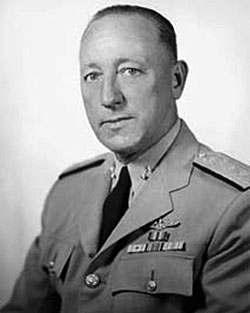
Vice
Admiral Charles Andrews Lockwood
May 6, 1890 - June 7, 1967
Charles
Andrews Lockwood was born in Midland, Va., on
May 6, 1890. He graduated from the U.S. Naval
Academy in the class of 1912.
Following brief
cruises in Mississippi and Arkansas, and
a short tour as instructor in the Naval Training
Station, Great Lakes, in September 1914 he reported
to the tender Mohican for indoctrination
in submarines. By 1 December of that year he had
his first submarine command, A-2, followed
by B-1.
American entry into World War
I found him in command of 1st Submarine Division,
Asiatic Fleet. From that time, with the exception
of a tour on the Asiatic station where he commanded
gunboats Quiros and El Cano on
the Yangtze Patrol and the destroyer Smith
Thompson, practically all his sea service
was in and connected with submarines. In addition
to those listed above are added G-1, N-5, UC-97 (ex-German). R-25,
S-14, and Bonita.The ex UC-97 was
used to evaluate the capabilities of German submarine
equipment.
In June 1939 he became Chief of Staff
to Commander Submarine Force, U.S. Fleet, in cruiser Richmond. This
important service was interrupted in February 1941
when he was sent to London as naval attaché and
principal observer for submarines. Following promotion
to rear admiral in March 1942 he proceeded to west
Australia as Commander, Submarines, Southwest Pacific.
Following the death of
Rear Admiral Thomas English in February 1943, Lockwood
shifted his flag to Pearl Harbor, assuming direction
of Pacific Fleet submarines. During his tour, Lockwood
improvised tactics to make the most effective use
of submarines and pushed the Navy’s Bureaus
of Ships and Ordnance to provide his men with the
most effective submarines and torpedoes possible.
He oversaw the tests that proved early U.S. torpedo
unreliability and prompted the improvements that
made them the highly effective weapons they became
in 1944 and 1945. The U.S. submarine force's wartime
success was achieved with the lowest casualty rate
of any combatant submarine service on either side.
Lockwood's strong leadership and devotion to his
troops won him the nickname "Uncle Charlie" and
a promotion to Vice Admiral in late 1943. His
wartime awards were the Distinguished Service Medal
and two gold stars in lieu of second and third
awards, and the Legion of Merit.
After
the war Lockwood served as Inspector General of
the Navy until his retirement in June 1947.
In retirement at Los
Gatos, Calif., he wrote and coauthored best selling
books on naval history and submarine operations
until his death on June 7, 1967.
Read "American Submariner"
article "Charles Lockwood: Architect of Attack"